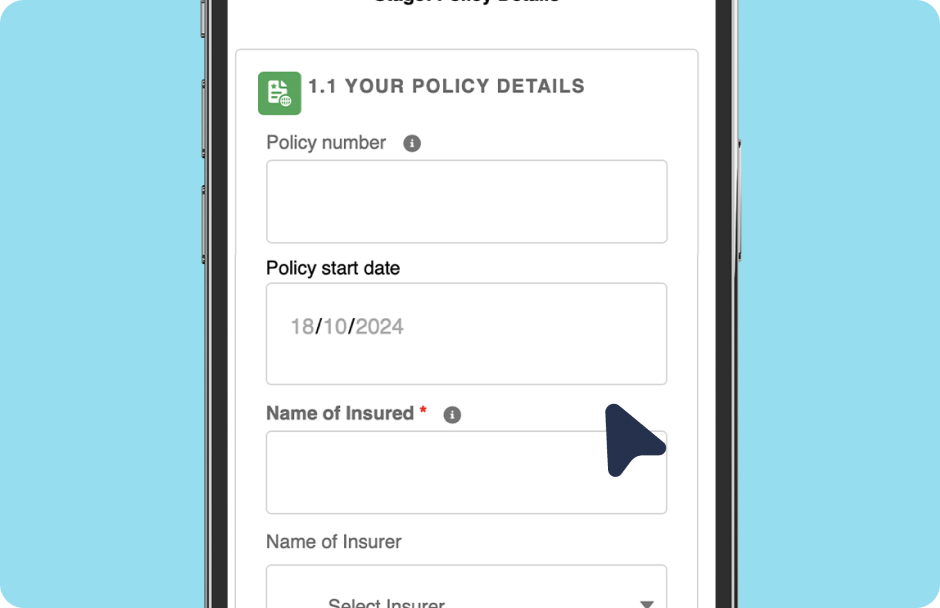Compare quotes from our trusted insurance partners:
On this page:
What is electrical contractor insurance?
Insurance for electricians helps protect against financial losses caused by various risks, such as mistakes in your work, property damage, stolen tools, and other risks of the trade
Working as an electrician comes with risk. Fires, injuries from live wires, accidental damage to a customer’s home, tool theft, just to name a few… these are just some of the potentially expensive hazards that could create unplanned bills for sparkies.
BizCover makes it easy to compare online quotes and tailor your cover to match your business needs, so you’ll only pay for the cover you need.

Why is electricians’ liability insurance important?
Working with residential and commercial electrical systems can create unique risks—from live wires to working with specialised equipment. If things go wrong, you could be liable for compensation and legal costs.
Electricians may need business insurance to get licensed, meet contractual requirements and cover unexpected costs.
Enter a jobsite
Lease a workshop
Become licensed
Work as a contractor or sub-contractor
Pay legal costs if you face a liability claim
Who needs electricians’ business insurance?
Most electrical contractors consider business insurance to protect their businesses, including sole trader and self-employed electricians, cabling installers, and appliance installation services.
Electricians
Cabling Installation
Garage Door Installation & Maintenance
Antennae Installation
Pay TV Installation
Household Appliance Installation
Let’s cover your small business on the go
Start a quote to see how much you can save and buy online in minutes.
Public Liability for Electricians
Public Liability insurance is one of the most common types of cover for electricians. It covers legal fees and compensation costs if a customer, member of the public, or a supplier claims against you for injury or damage to their property as a result of your alleged negligent business activity.
In most states and territories, Public Liability is mandatory for electricians to become licensed. It may also be required to take on jobs, enter worksites, or lease commercial space for your business.
With BizCover, you can choose Public Liability cover up to $20 million that covers:
- Personal injury – Compensation for third-party personal injuries
- Property damage – Compensation for third-party property damage
- Damage in custody – Compensation for damage of third-party goods in your care, custody, or control
- Legal and defence – Legal costs associated with a claim
What does electricians’ insurance cover?
BizCover offers insurance options designed to protect your business, tools and reputation.
Tailor your insurance package to match your business needs.
Common policies for electricians:
Additional cover:
How much does electricians’ insurance cost?
The average cost of business insurance for electricians is $96 per month * with BizCover.
However, the price you pay may depend on factors such as the size, risks, and needs of your business.

Factors influencing cost
Risks of the industry
Cover level amount
Annual turnover
Number of employees
Claims history
*Customer Average Monthly Payment Report is based on 1 July 2024 to 30 June 2025 and presented as a guide only. It may not reflect pricing for your particular business, as individual criteria will apply.
Get cover that works with the risks of your business
With BizCover, you can choose flexible levels of electrical cover.
Unsure how much to choose? Think about:
Underinsurance
We know it’s tempting to select a lower level of cover to reduce premiums, but this can leave businesses shocked and insufficiently covered when making a claim.
Ways underinsurance catches business owners out:
Inflation
With inflation, the cost of living and doing business increases. Remember to over yourself, your tools and assets for the rising costs of replacing or covering them, not what you paid for them – you may be surprised at the difference.
Not covering the full cost of your risks
If you select cover levels for less than the value you may be found liable – left out of pocket when it comes to claims time. It’s important to review your risks and determine how much you will need to cover any claim that may come your way.

Factors influencing cost
Risks of the industry
Cover level amount
Annual turnover
Number of employees
Claims history
Customer Average Monthly Payment Report is based on 1 July 2023 to 30 June 2024 and presented as a guide only. It may not reflect pricing for your particular business, as individual criteria will apply.
Get cover that works with the risks of your business
Select different cover amounts for each policy listed below.
This is the most you will be paid out if you need to make a claim.
Unsure how much to choose? Think about:
Statutory professional requirements
Cover required by contracts
Number of employees being covered
Your contract value
Worst case scenario claim size
Underinsurance
We know it’s tempting to select a lower level of cover to reduce premiums, but this can leave businesses shocked and insufficiently covered when making a claim.
Ways underinsurance catches business owners out:
Inflation
With inflation, the cost of living and doing business increases. Remember to over yourself, your tools and assets for the rising costs of replacing or covering them, not what you paid for them – you may be surprised at the difference.
Not covering the full cost of your risks
If you select cover levels for less than the value you may be found liable – left out of pocket when it comes to claims time. It’s important to review your risks and determine how much you will need to cover any claim that may come your way.
How It Works – Buying Online
5 easy steps to get instant cover online today

Select Profession
Pick Your Covers
Add Business Details
Compare Quotes
Get Covered Online
How To Make a Claim Online
We’ll assist you through the claims process & manage the claim directly with the insurer.

Let us know Fill out our
claims form and provide info
to support the claim
Receive extra support We
will assist you with your claim
Claim results We will notify
you of the claim outcome.



Award-Winning Tech & People
We’re not ones to blow our own trumpet, but we are pretty proud of our innovative insurance platform, outstanding team, and stellar workplace.
See How Much Others Have Saved By Purchasing a Policy Through BizCover
^ Savings made from January 2024 to April 2025. This information is provided as a guide only and may not reflect pricing for your particular business, as individual underwriting criteria will apply.
Frequently asked questions
Public Liability insurance is required for electricians to become licensed in most states and territories of Australia. Electricians are usually required to have a minimum cover level. For example, Victorian sparkies must have a minimum of $5 million in Public Liability cover.
If you work in Queensland, you’ll also be required to hold the Consumer Protection extension with a minimum level of $55,000 of cover to provide protection to consumers for defects in electrical work, non-completion of electrical work and liability resulting in an electrician testing their own work.
There are many types of insurance that electricians might consider, such as:
- Personal Accident & Illness – Helps replace lost income if you are unable to work due to an injury or serious illness.
- Public Liability – The most common type of cover for electricians, as it is required to become licensed in most states and territories.
- Professional Indemnity – May be required for work contracts or to perform certain types of work.
- Portable Equipment – Helps protect your tools and trade and essential equipment.
- Contents – Can cover your stock and supplies.
Whether you work for yourself or as a contractor for a trades business, BizCover has tailored cover options for electrical contractors.
Generally speaking, Professional Indemnity insurance is not required by law for Australian electricians. However, a policy may be required by project contract, to join professional trade organisations, or to complete specific types of work.
Even if a Professional Indemnity policy is not required for your business, you may still want to consider getting a policy. It can cover you for losses claimed by a third party and defence costs due to alleged or actual negligence in your professional services or advice.
Self-employed electricians may consider different types of insurance to protect themselves and their business. Certain types of cover, such as Public Liability and Professional Indemnity insurance, may be required to meet licensing or contractual obligations. Other types of cover can help protect your business assets, like Portable Equipment or Contents insurance (both cover options available through a Business Insurance Package).
Yes, Portable Equipment cover helps protect your tools and equipment. It is an option available through a Business Insurance Package.
















Real-life customer reviews verified by Feefo